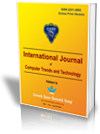Lawful and Righteous Considerations for the Use of Artificial Intelligence in Public Health |
||
 |
 |
|
| © 2024 by IJCTT Journal | ||
| Volume-72 Issue-1 |
||
| Year of Publication : 2024 | ||
| Authors : Patel Keyur | ||
| DOI : 10.14445/22312803/IJCTT-V72I1P108 | ||
How to Cite?
Patel Keyur, "Lawful and Righteous Considerations for the Use of Artificial Intelligence in Public Health," International Journal of Computer Trends and Technology, vol. 72, no. 1, pp. 48-52, 2024. Crossref, https://doi.org/10.14445/22312803/IJCTT-V72I1P108
Abstract
The research paper considers the transformational effects of AI and ML entailed by algorithms used on public health, with the conduction of statistical data from freely available databases. One part of the practice involves information mining from EHRs and leveraging the media for diverse health data. Nevertheless, ethical considerations that include user consent, security issues, violation of privacy, biases, and legal uncertainties, such as regulatory frameworks and accountability issues, must be critically considered. Recommendations highlight such things as the need for explainability, AI safety, and public engagement and provide ways of channeling future research to bolster both the efficacy with which AI is applied and how it remains ethical when deployed in matters concerning public health.
Keywords
Artificial intelligence, Machine learning, Public health, Ethical, Legal.
Reference
[1] Julia Amann et al., “Explainability for Artificial Intelligence in Healthcare: A Multidisciplinary Perspective,” BMC Medical Informatics and Decision Making, vol. 20, pp. 1-9, 2020.
[CrossRef] [Google Scholar] [Publisher Link]
[2] Elizabeth Brown, “A Healthy Mistrust: Curbing Biometric Data Misuse in the Workplace,” Stanford Technology Law Review, vol. 23, pp. 252-305, 2020.
[Google Scholar] [Publisher Link]
[3] Emna Chikhaoui, Alanoud Alajmi, and Souad Larabi-Marie-Sainte, “Artificial Intelligence Applications in the Healthcare Sector: Ethical and Legal Challenges,” Emerging Science Journal, vol. 6, no. 4, pp. 717-738, 2020.
[CrossRef] [Google Scholar] [Publisher Link]
[4] Kah Meng Chong, “Privacy-Preserving Healthcare Informatics: A Review,” 16th IMT-GT International Conference on Mathematics, Statistics and their Applications (ICMSA 2020), vol. 36, pp. 1-10, 2020.
[CrossRef] [Google Scholar] [Publisher Link]
[5] Golnar Karimian, Elena Petelos, and Silvia M.A.A. Evers, “The Ethical Issues of the Application of Artificial Intelligence in Healthcare: A Systematic Scoping Review,” AI and Ethics, vol. 2, pp. 539-551, 2022.
[CrossRef] [Google Scholar] [Publisher Link]
[6] Ricky Leung, “Using AI-ML to Augment the Capabilities of Social Media for Telehealth and Remote Patient Monitoring,” Healthcare, vol. 11, no. 12, pp. 1-11, 2023.
[CrossRef] [Google Scholar] [Publisher Link]
[7] Francis McKay et al., “Artificial Intelligence and Medical Research Databases: Ethical Review by Data Access Committees,” BMC Medical Ethics, vol. 24, pp. 1-7, 2023.
[CrossRef] [Google Scholar] [Publisher Link]
[8] Nithesh Naik et al., “Legal and Ethical Consideration in Artificial Intelligence in Healthcare: Who Takes Responsibility?,” Frontiers in Surgery, vol. 9, pp. 1-6, 2022.
[CrossRef] [Google Scholar] [Publisher Link]
[9] Eric Racine, Wren Boehlen, and Matthew Sample, “Healthcare Uses of Artificial Intelligence: Challenges and Opportunities for Growth,” Healthcare Management Forum, vol. 32, no. 5, pp. 272-275, 2019.
[CrossRef] [Google Scholar] [Publisher Link]
[10] Nabile M. Safdar, John D. Banja, and Carolyn C. Meltzer, “Ethical Considerations in Artificial Intelligence,” European Journal of Radiology, vol. 122, 2020.
[CrossRef] [Google Scholar] [Publisher Link]
[11] Athanasios Samaras et al., Artificial Intelligence-Based Mining of Electronic Health Record Data to Accelerate the Digital Transformation of the National Cardiovascular Ecosystem: Design Protocol of the CardioMining Study,” BMJ Open, vol. 13, no. 4, pp. 1-7, 2023.
[CrossRef] [Google Scholar] [Publisher Link]
[12] Daniel Schönberger, “Artificial Intelligence in Healthcare: A Critical Analysis of the Legal and Ethical Implications,” International Journal of Law and Information Technology, vol. 27, no. 2, pp. 171-203, 2019.
[Google Scholar] [Publisher Link]
[13] “Fact sheet: President Biden Issues Executive Order on Safe, Secure, and Trustworthy Artificial Intelligence,” The White House, 2023.
[Google Scholar] [Publisher Link]
[14] Soumya Swaminathan, Ethics and Governance of Artificial Intelligence for Health: WHO Guidance, World Health Organization, pp. 1- 165, 2021.
[Google Scholar] [Publisher Link]
